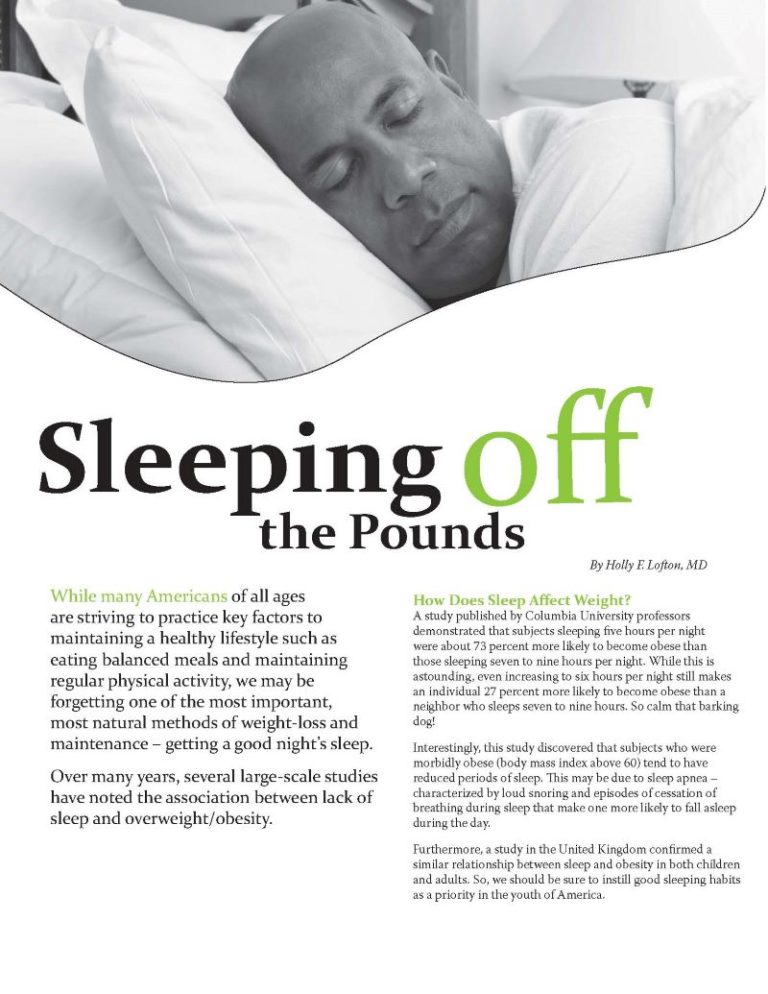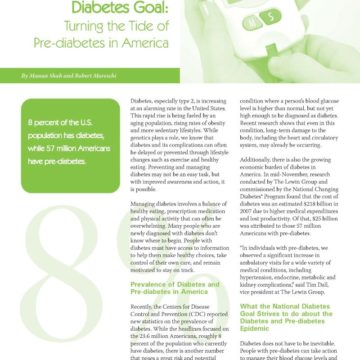Sleeping off the Pounds


by Holly F. Lofton, MD
Summer 2009
While many Americans of all ages are striving to practice key factors to maintaining a healthy lifestyle such as eating balanced meals and maintaining regular physical activity, we may be forgetting one of the most important, most natural methods of weight-loss and maintenance – getting a good night’s sleep.
Over many years, several large-scale studies have noted the association between lack of sleep and overweight/obesity.
How Does Sleep Affect Weight?
A study published by Columbia University professors demonstrated that subjects sleeping five hours per night were about 73 percent more likely to become affected by obesity than those sleeping seven to nine hours per night. While this is astounding, even increasing to six hours per night still makes an individual 27 percent more likely to become affected by obesity than a neighbor who sleeps seven to nine hours. So calm that barking dog!
Interestingly, this study discovered that subjects with severe obesity (body mass index above 60) tend to have reduced periods of sleep. This may be due to sleep apnea – characterized by loud snoring and episodes of cessation of breathing during sleep that make one more likely to fall asleep during the day.
Furthermore, a study in the United Kingdom confirmed a similar relationship between sleep and obesity in both children and adults. So, we should be sure to instill good sleeping habits as a priority in the youth of America.
Recommendations for Sleep
The current recommendations for sleep are:
| Infants (3-11 months old) | 14 to 15 hours |
| Toddlers | 12 to 14 hours |
| Pre-school Child | 11 to 13 hours |
| School-aged Children | 10 to 11 hours |
| Adolescents | 9 hours |
| Adults | 7 to 9 hours |
Hormones and Your Weight
While these studies cannot be used to imply a cause and effect relationship, the correlation cannot be ignored. Scientists have devised a theory to explain why lack of sleep is associated with higher weight.
Two hormones, ghrelin and leptin, play important roles in controlling hunger and they are activated based on how much a person sleeps. Simply put, leptin decreases the sensation of hunger and ghrelin stimulates hunger.
While we sleep, our bodies use the down time to process the amount of fat stores present. If we have an adequate amount of sleep time, excess fat stores can be recognized and thus, the hormone leptin is activated to tell us to eat less the following day. However, when a person is sleep deprived, the levels of leptin decrease and ghrelin, a hunger hormone, is activated and we are stimulated to eat more the next day. This phenomenon may sound familiar if you noticed a craving for high-calorie, starchy foods the day after working or studying late. Several years of sleep deprivation can really cause you to pack on the pounds.
Your mother was right! Hitting the sack is not only useful for staying awake the next day but also giving your body the rest it needs to maintain a hormone balance that will help you eat less and have more energy to sustain exercise.
If you have trouble sleeping or maintaining sleep after adopting the habits of sleep hygiene, be sure to discuss your symptoms with your medical provider as proper diagnosis and treatment of sleep disorders is essential to maintaining a healthy weight as well as general well-being.
Common Sleep Disorders
- Insomnia – difficulty falling asleep or maintaining sleep
- Sleep apnea – loud snoring and interruptions in breathing when sleeping
- Shift work sleep disorder – inability to fall asleep or excessive sleepiness in a person who works evening shifts or alternating shifts
Helpful Tips to Catch Some Zzz’s
For those of you who toss and turn all night, meeting these goals can be challenging. So, just for you, a medical specialty called sleep medicine was derived. Sleep specialists have developed a set of proven rules called “sleep hygiene” that will increase your likelihood of getting your “zzz’s.”
- Avoid napping during the day.
- Maintain a regular bedtime routine and try to stick with the same sleeping and waking times seven days a week.
- Avoid caffeine, nicotine, alcohol and stimulant medications close to bedtime.
- Reserve vigorous exercise for morning or late afternoon. Opt for more relaxing exercises at night.
- Avoid large meals at bedtime. Keep evening snacks in the 100-200 calorie range.
- Elderly people and night-shift workers should be sure to get good light exposure during “daytime” from indoor lighting, while closing blinds, etc. 1-2 hours before bedtime to help set the Circadian rhythm.
- Use the bed only for sleeping and sex. Try not to read, eat or watch television in bed.
- Keep your sleep environment comfortable, pleasant and climate-controlled.
…Happy Dreams!
About the Author:
Holly F. Lofton, MD, is currently an Associate Physician at the Geisinger Center for Nutrition and Weight Management in Danville, PA. Her specialty is geared toward adapting life-long lifestyle changes that lead to successful weight-loss as well as caring for patients undergoing bariatric surgery.
by Robyn Pashby, PhD Winter 2024 “No one is ever going to date you if you don’t…
Read Articleby Nina Crowley, PhD, RD (with Inspiration from Shawn Cochran) Winter 2024 Dating, no matter your age,…
Read Articleby Leslie M. Golden, MD, MPH, ABOM Diplomate Winter 2024 The journey to overcoming obesity is a…
Read Article









